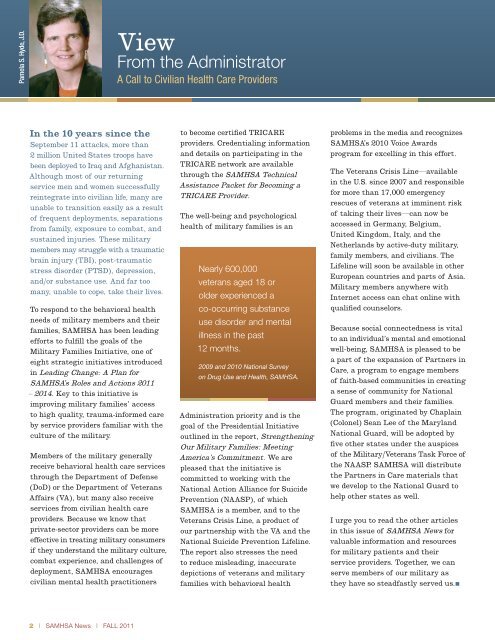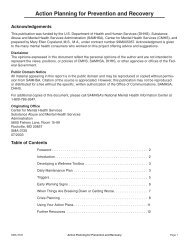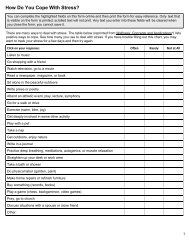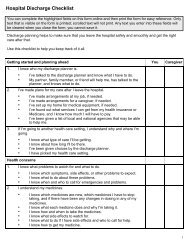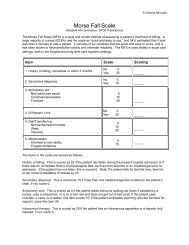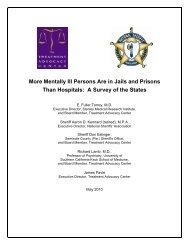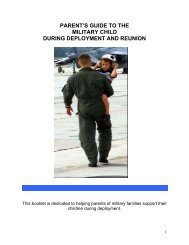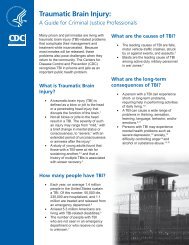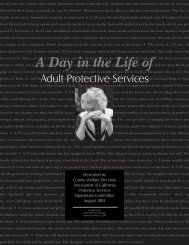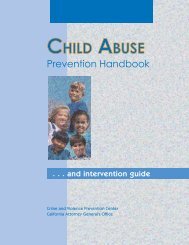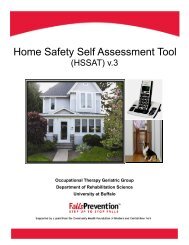Download PDF - Substance Abuse and Mental Health Services ...
Download PDF - Substance Abuse and Mental Health Services ...
Download PDF - Substance Abuse and Mental Health Services ...
You also want an ePaper? Increase the reach of your titles
YUMPU automatically turns print PDFs into web optimized ePapers that Google loves.
Pamela S. Hyde, J.D.<br />
View<br />
From the Administrator<br />
A Call to Civilian <strong>Health</strong> Care Providers<br />
In the 10 years since the<br />
September 11 attacks, more than<br />
2 million United States troops have<br />
been deployed to Iraq <strong>and</strong> Afghanistan.<br />
Although most of our returning<br />
service men <strong>and</strong> women successfully<br />
reintegrate into civilian life, many are<br />
unable to transition easily as a result<br />
of frequent deployments, separations<br />
from family, exposure to combat, <strong>and</strong><br />
sustained injuries. These military<br />
members may struggle with a traumatic<br />
brain injury (TBI), post-traumatic<br />
stress disorder (PTSD), depression,<br />
<strong>and</strong>/or substance use. And far too<br />
many, unable to cope, take their lives.<br />
To respond to the behavioral health<br />
needs of military members <strong>and</strong> their<br />
families, SAMHSA has been leading<br />
efforts to fulfill the goals of the<br />
Military Families Initiative, one of<br />
eight strategic initiatives introduced<br />
in Leading Change: A Plan for<br />
SAMHSA’s Roles <strong>and</strong> Actions 2011<br />
– 2014. Key to this initiative is<br />
improving military families’ access<br />
to high quality, trauma-informed care<br />
by service providers familiar with the<br />
culture of the military.<br />
Members of the military generally<br />
receive behavioral health care services<br />
through the Department of Defense<br />
(DoD) or the Department of Veterans<br />
Affairs (VA), but many also receive<br />
services from civilian health care<br />
providers. Because we know that<br />
private-sector providers can be more<br />
effective in treating military consumers<br />
if they underst<strong>and</strong> the military culture,<br />
combat experience, <strong>and</strong> challenges of<br />
deployment, SAMHSA encourages<br />
civilian mental health practitioners<br />
to become certified TRICARE<br />
providers. Credentialing information<br />
<strong>and</strong> details on participating in the<br />
TRICARE network are available<br />
through the SAMHSA Technical<br />
Assistance Packet for Becoming a<br />
TRICARE Provider.<br />
The well-being <strong>and</strong> psychological<br />
health of military families is an<br />
Nearly 600,000<br />
veterans aged 18 or<br />
older experienced a<br />
co-occurring substance<br />
use disorder <strong>and</strong> mental<br />
illness in the past<br />
12 months.<br />
2009 <strong>and</strong> 2010 National Survey<br />
on Drug Use <strong>and</strong> <strong>Health</strong>, SAMHSA.<br />
Administration priority <strong>and</strong> is the<br />
goal of the Presidential Initiative<br />
outlined in the report, Strengthening<br />
Our Military Families: Meeting<br />
America’s Commitment. We are<br />
pleased that the initiative is<br />
committed to working with the<br />
National Action Alliance for Suicide<br />
Prevention (NAASP), of which<br />
SAMHSA is a member, <strong>and</strong> to the<br />
Veterans Crisis Line, a product of<br />
our partnership with the VA <strong>and</strong> the<br />
National Suicide Prevention Lifeline.<br />
The report also stresses the need<br />
to reduce misleading, inaccurate<br />
depictions of veterans <strong>and</strong> military<br />
families with behavioral health<br />
problems in the media <strong>and</strong> recognizes<br />
SAMHSA’s 2010 Voice Awards<br />
program for excelling in this effort.<br />
The Veterans Crisis Line—available<br />
in the U.S. since 2007 <strong>and</strong> responsible<br />
for more than 17,000 emergency<br />
rescues of veterans at imminent risk<br />
of taking their lives—can now be<br />
accessed in Germany, Belgium,<br />
United Kingdom, Italy, <strong>and</strong> the<br />
Netherl<strong>and</strong>s by active-duty military,<br />
family members, <strong>and</strong> civilians. The<br />
Lifeline will soon be available in other<br />
European countries <strong>and</strong> parts of Asia.<br />
Military members anywhere with<br />
Internet access can chat online with<br />
qualified counselors.<br />
Because social connectedness is vital<br />
to an individual’s mental <strong>and</strong> emotional<br />
well-being, SAMHSA is pleased to be<br />
a part of the expansion of Partners in<br />
Care, a program to engage members<br />
of faith-based communities in creating<br />
a sense of community for National<br />
Guard members <strong>and</strong> their families.<br />
The program, originated by Chaplain<br />
(Colonel) Sean Lee of the Maryl<strong>and</strong><br />
National Guard, will be adopted by<br />
five other states under the auspices<br />
of the Military/Veterans Task Force of<br />
the NAASP. SAMHSA will distribute<br />
the Partners in Care materials that<br />
we develop to the National Guard to<br />
help other states as well.<br />
I urge you to read the other articles<br />
in this issue of SAMHSA News for<br />
valuable information <strong>and</strong> resources<br />
for military patients <strong>and</strong> their<br />
service providers. Together, we can<br />
serve members of our military as<br />
they have so steadfastly served us.•<br />
2 | SAMHSA News | FALL 2011


